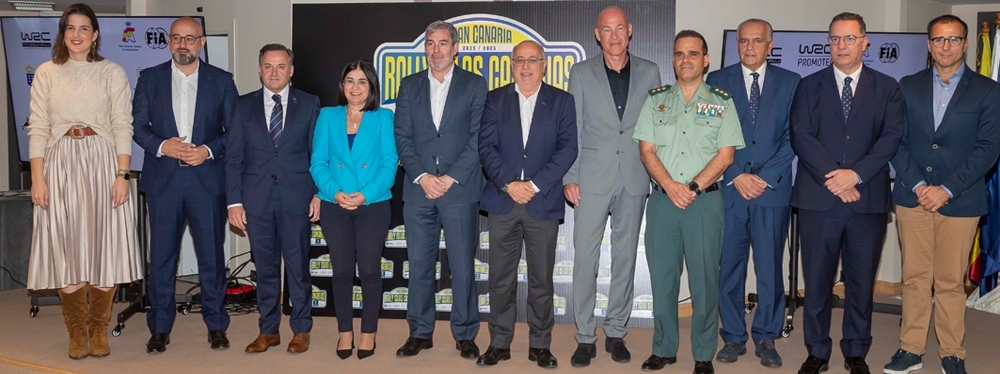Following in the footsteps of Tet Rally Latvia and ORLEN 80th Rally Poland, both of which have used the pathway of the FIA European Rally Championship (ERC) to join the WRC in 2024, Rally Islas Canarias will move from the ERC to WRC in 2025 and 2026.*
First run in 1977, Rally Islas Canarias has continuously been part of the ERC since 2016 and in 2026 will celebrate its 50th edition, as part of the pinnacle of rallying. It is intended to run exclusively on Gran Canaria in 2025, before expanding to include other islands for it’s 50th anniversary.
Today’s announcement was made in front of media on Gran Canaria and, in addition to WRC Promoter and Todo Sport, was attended among others by Canary Islands President Fernando Clavijo, President of the Island Council of Gran Canaria Antonio Morales, the mayor of Las Palmas de Gran Canaria, Carolina Darias, and FIA World Motor Sport Council Member and Real Federación Española de Automovilismo (RFEDA) President Manuel Aviñó.
“Bringing the Rally Islas Canarias to the WRC has been the reward for many years of work. It was a goal desired by several generations, and now, together with WRC Promoter, it has become within reach”, expressed Germán Morales, CEO of the event promoter Club Deportivo Todo Sport.
“Since adding the European Rally Championship to our portfolio of championships, we have been left with little doubts about the capabilities of the rally management team to run this rally next year on the WRC calendar,” expressed WRC Promoter Managing Director Jona Siebel.
“We are enthusiastic about having Spain back on the WRC calendar and are encouraged to see our clearly defined strategy to have an opportunity for ERC events to have a pathway to WRC coming to fruition as Rally Islas Canarias follows on from Latvia and Poland in 2024.”
Moving from the ERC to WRC calendar will have the added benefit of the expected influx of thousands of fans who will make their way to the popular European holiday destination, combining the fast-paced action on the blistering-quick stages with a kickstart to their summer.
The rally promises smooth, twisting asphalt surfaces which rise and dip across the volcanic inlands. While coastal temperatures are renowned for favourable year-round beach-going weather, drivers need to be prepared for changeable weather conditions as the stages snake their way through the islands’ mountainous interiors.
The WRC most recently visited Spain in 2022 when the rally was based out of the Catalunyan beachside resort of Salou.
The AC Hotel Gran Canaria, in Las Palmas de Gran Canaria, hosted the signing of the agreement, and subsequent press conference, between WRC Promoter, the entity that promotes the World Rally Championship (WRC), and Todo Sport, the firm that organizes the Rally Islas Canarias. The Government of the Canary Islands and the Cabildo of Gran Canaria have also acted in this signing, two pillars that have been crucial to obtaining this achievement, in addition to Mr. Manuel Aviñó as president of the Real Federación Española de Automovilismo (RFEDA) and Mr. José Ángel Batista in quality of president of the Federación Canaria de Automovilismo (FCA).
More about WRC
The WRC began to be held in the 1973 season, so it already has more than 50 years of history. In 1991 it arrived in Spain, specifically Catalonia, a scene that hosted a good number of editions until a few seasons ago. Sebastien Loeb is the driver with the most championships, a total of nine, while Carlos Sainz is the only Spaniard who has been proclaimed world champion (1990 and 1992). Since the 2022 season, the WRC has in its first division the vehicles called Rally1, which house hybrid technology. The last world champion was the young Finn Kalle Rovanperä driving a Toyota Yaris.
More about Rally Islas Canarias
The event began to be held in 1977 under the name Rally El Corte Inglés, which it used until 2001. After a brief period of time (2002 to 2008) in which it was called Rally de Canarias, its name - since 2009 - is Rally Islas Canarias. Since the beginning of the 80s it has been linked to the European Rally Championship, to the point of becoming one of its most iconic rallies after more than 40 years. In 1995 it reached coefficient 20 within the FIA ERC, being a fixed event in this competition since 2016. Its most notable driver has been Carlos Sainz, with five consecutive wins between 1985 and 1989, followed by Jesús Puras and Alexey Lukyanuk, with four victories. each. The Frenchman Yoann Bonato, driving a Citroën C3 Rally2, was the latest winner of the Rally Islas Canarias.
*Pending World Motor Sport Council approval





